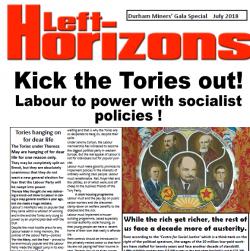By John Pickard
The Durham Miners’ Gala held last weekend shows that the largest trade union festival in the country has gone from strength to strength. A quarter of a million people, overwhelmingly working class, braved the soaring temperatures to see the union banners, hear the bands and listen to the speeches on the field, in a marvellous carnival atmosphere.
Whereas in the past the Gala had been exclusively a miners’ festival, it now a broad trade union event, with banners and representatives from every major trade union in the country. There were banners and trade unionists from all the four corners: England, Scotland, Wales and Northern Ireland. There were even groups of trade unionists from Europe. As is always the case, there was a special applause given by the crowds to the FBU banners as they made their way as a large contingent towards the field.
Although there are no longer any working collieries in the County of Durham, what were the mining communities, the ‘pit villages’, still have brass their own bands, often supported by young men and women and they keep the traditions alive. All the old lodge banners were in evidence and families, friends and neighbours – not to mention former miners, many wearing ‘Orgreave’ T-shirts – marched proudly in their wake.
Some of the most famous banners were there as usual: like the Follonsby banner, featuring the images of James Connolly, Keir Hardie, AJ Cook and George Harvey, with Lenin as the centre-piece. There was also the Chopwell banner, with Karl Marx, Keir Hardie and Lenin. In the 1920s, the village of Chopwell was so well-known for its support for communist ideas that it was known as ‘little-Moscow’. Listening to the cheering of the speeches, it seems that not a lot has changed.
One of the best features of the modern Gala is the inclusion of banners from primary schools, deliberately made as ‘miniatures’ in exactly the same style as miners’ lodge banners. This shows that the traditions of working class culture are quite properly being passed on to newer generations.
Listening to the speeches on the field, there is an overwhelming sense that real socialist ideas have a wide echo at this event, as indeed they have in any meeting of working class people. Every radical proposal, comment or remark is roundly cheered by the thousands of listeners. It was not always the case: in the not-too-distant past, the crowds had to suffer and grumble their way through the speeches of Labour and trade union leaders, whose calls to ‘belt-tightening’ and ‘austerity’ were not very much to their liking.
In fact, in the early 1970s, the Durham Miners’ Association was a bastion of the right wing in the National Union of Mineworkers. It was only due to the patient and persistent work of a handful of activists that it was changed. Starting with a Washington miner, Stan Pearce, and then supported by another, Davie Hopper (later general secretary of the DMA), a number of miners were influenced by the ideas of the Marxist newspaper, Militant. By discussion, argument and patiently explaining ideas to miners they managed to get in touch with across the whole coalfield, they were able to catalyse changes in many lodge committees and ultimately in the area committee. By the time of the 1984 miners’ strike, Durham was a bastion of the left and it has remained so to this day. In the year before he passed away, Davie Hopper, chairing the speeches at the Gala, announced in his inimitable Wearside accent to the cheering crowds, “there’ll be no right-wing MPs addressing the Gala as long as I’m general secretary.”
The biggest cheers for the speeches this year – as it has been for the last two – were reserved for Labour leader, Jeremy Corbyn. His policies and what they represent have come as a breath of fresh air to the overwhelmingly working-class audience of the Gala meeting: the kind of leader they waited for over many years.
This year’s Gala also saw the first experimental ‘hard copy’ issue of a Left-Horizons broadsheet, in the form of a four-page free news-sheet, including an article on the origins of the Gala, an article on austerity and the Tory Government and a piece on ‘what Left-Horizons stand for’. More than a thousand copies were given away and it was received very well. No doubt Stan Pearce and Davie Hopper, both now gone, would have enthusiastically approved the content of this broadsheet. It is hoped it will be the first of many. In the debates, discussions and political to-ing and fro-ing in the Labour Party and trade unions in the coming years, supporters of Left Horizons will play a significant part.
July 23, 2018



